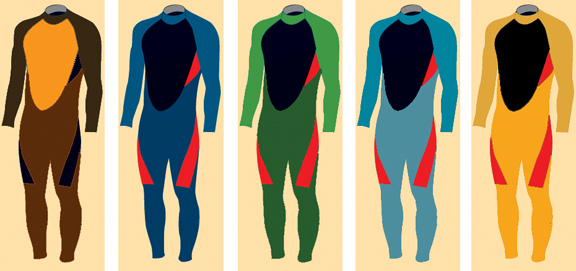Summer is the best time to learn how to surf in San Francisco because the waves tend to be smaller and more manageable, and the weather is generally nicer.

By Alex Kolovyansky
Published: May, 2006
A wetsuit works by allowing a small layer of water in between you and the suit. Your body heat warms that water and the neoprene keeps it warm.
Many surf shops rent wetsuits, but buying your own will pay for itself in roughly 10-20 uses, depending what kind you get. There are many brands to choose from but what is important is a good fit.
A suit must fit snugly all around. If there are folds or too much space between you and the material, water will collect in those spots. For a wetsuit to work properly, the layer of water inside must be thin. If the suit is loose, baggy or ill-fitting, when you dive under a wave your suit will fill with cold water and, consequently, each time that happens, your body will lose heat as it uses it to keep heating new water. So, make sure to try on different brands and styles of suits, and compare. The suit should fit snugly, but not too tight. You should definitely be able to move well, as you will be swimming and bending in moving water.
Movement-warmth-durability
There are several other considerations when choosing a wetsuit. First, consider the thickness of the suit material. In Bay Area waters, a 4/3 millimeter full suit is most common. What that means is 4mm of neoprene in the core (chest, etc.) and 3mm for the extremities. This thickness is generally accepted to be about right for the water temperature, and allows for a nice combination of warmth and mobility.
Second, make sure the seams are sealed - either taped or glued - so you donít have fresh, cold water coming in constantly.
Third, make sure your suit is suited for surfing, particularly if you are buying a pre-owned suit. And take note that triathlon and dive suits look similar to wetsuits -- triathlon suits tend to be less durable and dive suits often have a zipper down the front, which would be uncomfortable when paddling out on your board. Surfing wetsuits are made to endure the rigors of surfing and have reinforced areas (knees, elbows) and allow ease of movement (shoulders, chest).
Each manufacturer offers its own take on the wetsuit offering a multitude of options from for all levels of use. A new entry model suit costs from $100 and up to $500 plus. When buying one, consider not only the cost but the durability and fit. Also, keep an eye out for last yearís models, which tend to offer nicer features at a lower price.
Feet-hands-head
There are a couple of helpful accessories to the wetsuit. These include booties, a hood and gloves. Many people use booties year-round, and on cooler days, because the body looses a large portion of its heat through the head, a hood adds extra warmth. One other accessory, really more of a necessity, is waterproof sun block. It is recommended even on overcast or foggy summer days. Check the local UV Index at: http://www.epa.gov/sunwise/whereyoulive.html.
Water-quality-check
Lastly, it should be noted that, although generally safe, you should check the water quality before heading out, particularly after heavy rains when storm drain and urban run-off is most prevalent. One should also be aware of sewer spills and bacteria levels above State standards. According to Earth 911, all three may impact your health. As stated earlier, a wetsuit allows a thin layer of water to be against the body and inevitably we gulp some down during wipeouts so there is no real protection from microscopic bacteria that may not be visible in the water. To learn about the water quality and beach safety at your favorite surf spot, visit: www.earth911.org/waterquality

